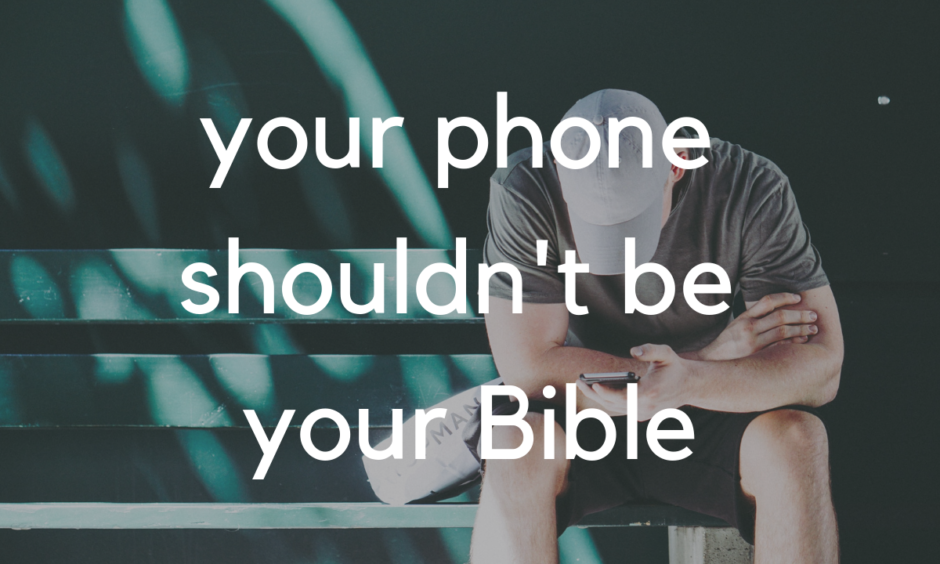Over the last several years of doing ministry I’ve seen many shifts, large and small, in the way people act and think. One of those shifts – and I believe it’s a significant one – is the move towards people using their smartphone as their primary Bible.
About half of our Threshingfloor community’s gatherings are spent reading and learning from God’s word. Six years ago I could almost guarantee that nearly everyone who was a regular part of our community would come with their Bible in hand, ready to discuss and learn. And if they didn’t bring a Bible they’d either look on at someone else’s or borrow an extra. Today I’d estimate the number that are regularly bringing their Bibles is probably closer to 30-40%, with the rest of the group intentionally not bringing a Bible and instead using their smartphones. I don’t think that’s a good thing.
Don’t get me wrong – I love my phone, and I love the fact that I can access the Bible on it. The last two years I’ve listened through the entire Bible each year thanks to the Youversion app, and it’s amazing to be able to do a Bible reading plan with friends, post thoughts and comments, and hear what others are learning and reading. It’s revolutionary and incredibly valuable.
That said, I don’t think your smartphone should be your primary Bible. When I first started writing this article I intended to title it “four theological reasons not to make your phone your Bible,” but as I sat down to study, outline, and write (that’s my usual three step process for these posts), I realized that that title was unfairly provocative. There’s no ironclad biblical or theological argument for not making your phone your Bible that I’ve found. However, there are plenty of practical reasons. Here are four.
1. You’ll be less distracted
Your cell phone is intentionally designed to distract you and draw your attention to whatever the notification of the moment is. Study after study has shown that simply having a phone within view (as mine is at this moment, sitting on my desk in my peripheral view, drawing my eye) divides a person’s attention and diminishes their ability to focus and be fully engaged.
When we come to God’s word we ought to – as far as possible – minimize distractions so that we can fully focus. Doing so not only honors God, who is certainly worthy of our full focus – it also enables us to get more out of the Word.
2. You’ll get more out of it.
The result of removing the distraction of the endless notifications that are impossible to ignore when you’re reading the Bible on your phone is that you’ll engage more deeply with God’s truth. Proverbs says that it’s the glory of God to hide a thing and the glory of a king to search it out. Such searching for wisdom and truth requires focus and full engagement.
Reading and studying the Word while partially distracted is better than not at all, better still is being fully focused. After all, don’t we come to God’s word to learn who God is and who we are? Why then would we do it only half-way? Let’s come to God’s word and get as much out of it as possible, something far more likely to happen when reading a physical Bible rather than reading on your phone.
3. You’ll see the context more clearly
This is one that I personally think is most important. Even if you have a large phone, the six inch screen limits the scope of your view to several sentences of a given text. It also prevents you from seeing beyond the end of the chapter, since most Bible apps require you to tap or swipe to move to the next chapter. That limited view hinders the natural reminder of the importance of context that comes when you see a whole chapter or two on the two pages open in front of you when you read a physical Bible.
Don’t forget, chapters and verses aren’t God given. They’re useful tools for finding your place in the Bible, and that’s it. Reading your Bible on your phone subconsciously communicates that each chapter is a full thought in and of itself, which its often not.
This lack of context makes people more likely to misinterpret verses that would otherwise be more accurately understood. It’s far easier and quicker to flip back four pages to see what Jesus said two chapters ago than it is to tap back and swipe up and down until you find the verse. Context is key, and your Bible app limits your consciousness of that context.
4. It limits sacred space
The Bible is God’s revealed Word to humanity, and that’s an incredible thing. We ought to come to it with respect and honor, a thing which is hindered when you encounter the Word just a couple taps from youtube ASMR videos of Jeff Goldblum’s voice and your Clash of the Clans game.
Keeping your primary Bible a physical one helps create a reminder of the sacred, physical reality of the significance of God’s Word. Sacred spaces are something we very much need in our frantic, rushed culture. Why not make your time in God’s word – whenever possible – also a moment to disconnect from that rush and enter into holy quiet and focus?
Your phone shouldn’t be your Bible. Praise God for the fact that you can access a Bible app and use it to engage God’s word on the go or when you’ve forgotten your Bible, but don’t let your phone replace the real thing. When you make it your normal practice to read a real Bible you’ll be less distracted, engage more deeply, see context more clearly, and discover the beauty of setting aside sacred space to encounter and learn from the Lord.




No Comments